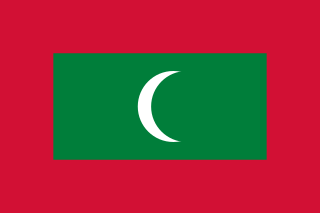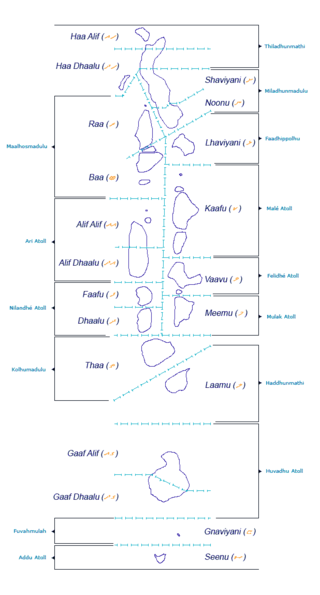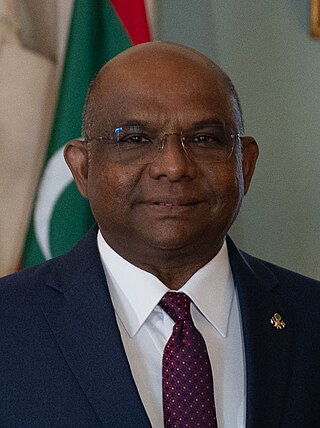Related Research Articles

The Maldives, officially the Republic of Maldives, and historically known as the Maldive Islands, is a country and archipelagic state in South Asia in the Indian Ocean. The Maldives is southwest of Sri Lanka and India, about 750 kilometres from the Asian continent's mainland. The Maldives' chain of 26 atolls stretches across the equator from Ihavandhippolhu Atoll in the north to Addu Atoll in the south.

The Maldives has remained an independent nation throughout its recorded history, save for a brief spell of Portuguese occupation in the mid-16th century. From 1887 to 1965, the country was a British protectorate while retaining full internal sovereignty. At its independence in 1965, the Maldives joined the United Nations on 20 September.

Islam is the state religion of Maldives. The 2008 Constitution or "Fehi Gānoon" declares the significance of Islamic law in the country. The constitution requires that citizenship status be based on adherence to the state religion, which legally makes the country's citizens 100% Muslim.

Fuvahmulah is an island (atoll) in the Maldives. It is under Maldives' administrative division of Gnaviyani Atoll. The island is the second southernmost administrative atoll, located to the south of Huvadhu Atoll and to the north of Seenu Atoll. It's also the third most populous island after Malé and Addu.

The culture of the Maldives is derived from a number of sources, the most important of which is its proximity to the shores of Sri Lanka and South India. The population is mainly Indo-Aryan from the anthropological point of view. Islam is considered the religion of the country and only Muslims can become legal citizens.

Hulhumeedhoo or Hulhudhoo-Meedhoo is an island located on the northeastern point of Addu City. It is the fifth largest island in the Maldives. Although Hulhumeedhoo is geographically one island, it is divided into two administrative constituencies of Addu City, known as Meedhoo and Hulhudhoo, which are roughly the northern half and southern half of Hulhumeedhoo respectively. The name "Hulhumeedhoo" is an amalgamation of the names Hulhudhoo and Meedhoo.

The wildlife of the Maldives includes the flora and fauna of the islands, reefs, and the surrounding ocean. Recent scientific studies suggest that the fauna varies greatly between atolls following a north–south gradient, but important differences between neighbouring atolls were also found, which may be linked to differences in fishing pressure – including poaching.

The Administrative Divisions of the Maldives refers to the various units of government that provide local government services in the Maldives. According to the Decentralization Act 2010, the administrative divisions of the Maldives would consist of atolls, islands, and cities; each administered by their own local council, under the basic terms of home rule. Geographically, the Maldives are formed by a number of natural atolls plus a few islands and isolated reefs which form a pattern from North to South. Administratively, there are currently 189 islands, 18 atolls and 4 cities in the Maldives.
The 2007 Malé bombing was a bomb blast on September 29, 2007, in Sultan Park near the Islamic Centre in the Maldivian capital Malé, injuring 12 foreign tourists. The park is located in the shadow Maldivian Army (MNDF) Headquarters where several surveillance cameras are trained. It was the first known bombing to take place in the Maldives.
Dhadimagu is an administrative division of Fuvahmulah, Maldives. It is the largest division of the island, located in the northern part of the island. Throughout history, many scholars and famous public figures came into being from this district housing many of the historical sites and landmarks of the island. A center of learning as well as an important location for the island's economy, the number of 'Hafiz's and teachers from this district outnumber that of any other district in Fuvahmulah, and this district is considered by many to be the most educated and learning-centered district of Fuvahmulah.
The 2008 Constitution of Maldives designates Sunni Islam as the state religion. Only Sunni Muslims are allowed to hold citizenship in the country and citizens may practice Sunni Islam only. Non-Muslim citizens of other nations can practice their faith only in private and are barred from evangelizing or propagating their faith. All residents are required to teach their children the Muslim faith. The president, ministers, parliamentarians, and chiefs of the atolls are required to be Sunni Muslims. Government regulations are based on Islamic law. Only certified Muslim scholars can give fatawa.

Maldivians are an Indo-Aryan ethnic group and nation native to the historic region of the Maldive Islands, present day Republic of Maldives and the island of Minicoy in Union Territory of Lakshadweep, India. Maldivians share one culture and speak the Maldivian language, which is a member of the southern group of Indo-Aryan languages. For ethnographic and linguistic purposes as well as geopolitical reasons, anthropologists divide the Maldivian people into three subgroups.

Israel–Maldives relations refer to foreign relations between Israel and the Maldives. The countries had diplomatic relations from 1965 to 1974. From 2012 to 2017, they maintained cooperation agreements, but did not restore full diplomatic relations. In 2024, the Maldives banned Israeli passport holders from entering the nation due to the Israeli government's conduct in the Israel–Hamas war.
Dhiguvaandu is an administrative division of Fuvahmulah, Maldives. It is one of the largest districts in Fuvahmulah located just after Dhadimago. Apart from Dhadimago, the district also share borders with Hōdhado and Mādhado.

Thoondu is a white sandy beach on the north of Fuvahmulah, Maldives. Located within Dhadimagu ward of the island, it is believed to be one of the most well known features of Fuvahmulah. Hundreds of people visit the beach every day, and this figure is much higher during special occasions like Maahefun. Thoondu has also been declared as a Protected area of Fuvahmulah by the government of Maldives on 12 June 2012 and the Atoll Council of Fuvahmulah has also passed a Decree to establish the place as a Protected area on 19 January 2012.
The 2011–2013 Maldives political crisis began as a series of peaceful protests that broke out in the Maldives on 1 May 2011. They would continue, eventually escalating into the resignation of President Mohamed Nasheed in disputed circumstances in February 2012. Demonstrators were protesting what they considered the government's mismanagement of the economy and were calling for the ouster of President Nasheed. The main political opposition party in the country, the Dhivehi Rayyithunge Party led by the former president of the country Maumoon Abdul Gayoom accused President Nasheed of "talking about democracy but not putting it into practice." The protests occurred during the Arab Spring.

Abdulla Shahid is a Maldivian politician who served as President of the 76th United Nations General Assembly between 2021 and 2022 and the President of the Maldivian Democratic Party. Shahid is the first Maldivian politician to hold that post. He had served as Minister of Foreign Affairs from 2018 to 2023.
Dhuvaafaru is an inhabited island of Maldives located in the eastern edge of Raa Atoll. Resettlement of the island started on 14 December 2008 to inhabit the displaced residents of Kandholhudhoo who were the victims of the 2004 Indian Ocean earthquake and tsunami.
Abdul Majeed Mahir is a Maldivian politician, born in Fuvahmulah to Funaadu Ganduvaru Aisha Didi of Fuvahmulah and Velaanaagey Mohamed Didi of Male, Maldives. He served high government posts during the reign of his nephew, President Ibrahim Nasir, such as the position of Deputy Minister of Finance and the position of Deputy Minister of Peace and Security according to some sources. He also served as the President of Male Municipality from 1960 to 1961 and served in the Management of MWSC during the reign of President Maumoon Abdul Gayoom.
Dhadimagi Kilhi is one of the two fresh water lakes in Fuvahmulah, Maldives.
References
- ↑ "Bandaara Kilhi". Visit Fuvahmulah. Retrieved 24 July 2024.
- ↑ "Common Moorhen; Exclusive Bird To Fuvahmulak In The Maldives". BLUEPEACE Maldives. 6 December 2011. Retrieved 24 July 2024.
- 1 2 Jameel, Abdulla (30 October 2012). "ފުވައްމުލަކުގެ ހިތްގައިމު ސަރަހައްދުގައި ހިތްގައިމު ރެސްޓޯރަންޓެއް" [Restaurant opened in Fuvahmulah]. Haveeru Daily (in Divehi). Archived from the original on 21 February 2014. Retrieved 2 February 2014.
- 1 2 "Photo of Khili". Panoramio. 11 December 2011. Archived from the original on 19 February 2014. Retrieved 2 February 2012.
- ↑ Adshan, Ahmed (29 December 2011). "ފުވައްމުލަކު ބަންޑާރަ ކިޅީގެ ހަޓްތައް ކުއްޔަށް ދޭން ނިންމައިފި" [Fuvahmulah's Bandaara Kilhi's hunts for rent]. Haveeru Daily . Archived from the original on 21 February 2014. Retrieved 2 February 2012.
- ↑ "Three areas in Fuvahmulah island declared as Protected Areas". Ministry of Housing and Environment. 18 June 2012. Archived from the original on 19 February 2014. Retrieved 2 February 2014.
- ↑ "Bandaara kilhi and surrounding wetland area". Maldives Protected Areas. Ministry of Climate Change, Environment and Energy. Retrieved 24 July 2024.